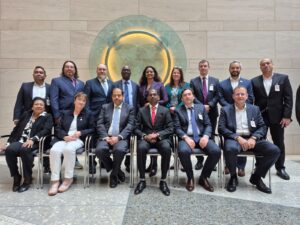At the International Monetary Fund in Washington this September, Matthieu Lamy, Secretary General of the International Cost Management Standard (ICMS), addressed policymakers, economists, and industry leaders on a theme at once technical and visionary: the role of Europe in shaping the next era of cost management.
His speech marked the 10th anniversary of ICMS, a milestone not only for construction and infrastructure but for global economic governance. “What we have built together,” he said, “is not just a framework it is a compass, a shared language, and a collective vision for how we build, invest, and account for value in a world that demands transparency, sustainability, and trust.”
Cost Management as Strategy, Not Accounting
Matthieu framed cost management as far more than a technical back-office discipline. In an age defined by inflation, climate urgency, and geopolitical complexity, he argued, cost managers are becoming “economic architects.” Their role is to reconcile ambition with feasibility, ensuring that every unit of currency spent generates long-term value for governments, investors, and societies alike.
The essence of this strategic mindset, he explained, is the ability to affirm:
“This project is worth what it costs. And it costs what it’s worth.”
Europe as a Laboratory of Harmonization
Turning to Europe, Matthieu underscored the continent’s paradox: vast diversity 50 countries, 23 EU members, 24 languages, 30 currencies, and multiple systems of measurement yet an increasing drive toward convergence.
“Europe is complex. It is diverse. But it is also visionary,” he said. By adopting ICMS as a common denominator in infrastructure planning, climate policy, and fiscal governance, Europe could achieve something transformative:
Comparable public investments across borders.
Carbon impacts tracked with the same rigor as financial costs.
Confidence for private investors from Lisbon to Warsaw.
In this vision, ICMS becomes not only a financial tool but an enabler of credibility, efficiency, and sovereignty.
ICMS: The Esperanto of Cost
If money is a universal concern, ICMS is the universal language that makes its management coherent across nations. Matthieu described the standard as “the Esperanto of cost” a system that allows projects in Dublin, Paris, Rabat, and Montreal to be compared, understood, and benchmarked without erasing local expertise.
And the adoption is tangible: Ireland has integrated ICMS into public procurement, while technology firms such as Autodesk have embedded it into project management tools. “This is not the future,” Matthieu emphasized. “This is now.”
France: From Resistance to Renaissance
In a candid reflection, Matthieu spoke of his own country’s evolving stance. France, with its rich engineering tradition and independent spirit, had long been resistant to international standards. But today, the tide is turning.
ICMS has been:
Translated into French by UNTEC,
Published by national professional bodies,
Integrated into standards,
Taught in schools, and
Adopted by French professionals in international contexts.
Far from diluting French expertise, ICMS is enabling it to expand globally, providing structure to a fragmented market and positioning France once more as a normative leader in construction economics.
The Next Steps: Educate, Pilot, Unite
Looking ahead, Matthieu outlined three priorities:
Educate – Embed ICMS in universities, engineering schools, and professional training.
Pilot – Test ICMS-based frameworks in public infrastructure, housing, and energy projects.
Unite – Build bridges between national federations, European institutions, and private investors.
“Let’s not wait for alignment to happen,” he urged. “Let’s lead it.”
A Standard, A Vision, A Responsibility
For Matthieu Lamy, ICMS is ultimately not about technical compliance but about accountability and vision. It is about ensuring that ambition is grounded in rigor, that transparency fosters trust, and that cost is understood not merely as a figure but as a story of value, impact, and purpose.
“If Europe wants to meet its climate targets, its social commitments, and its economic challenges,” he concluded, “it must speak the language of cost. And that language is ICMS.”
The message is clear: standards are not barriers but bridges. And Europe, with its complexity and its capacity for harmonization, is uniquely positioned to lead.


